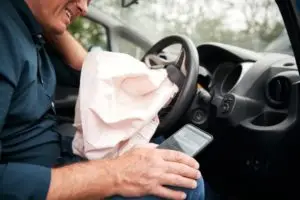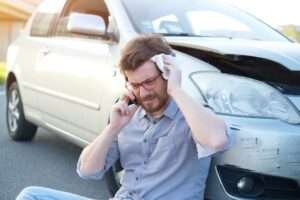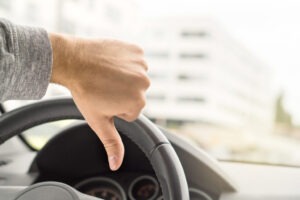
Car accidents aren’t something we plan on experiencing when we get behind the wheel, but statistics prove that we take a significant risk every time we drive. About 6 million people are involved in car accidents each year, and about 3 million are injured. This means that knowing what to do following an automobile accident is important for any Florida resident, particularly those that drive frequently.
If you have an accident on Florida roadways that results in injuries to someone, there are definitely some things you shouldn’t do, such as leaving the scene. There are also some things that you should do, which we discuss in detail below.
Get off the Road, but Stay on the Scene and Protect It
Immediately following the accident, if your car is not completely disabled, you should attempt to move it off of the roadway to prevent chain-reaction crashes or a backup in the flow of traffic. Don’t go very far from where the accident occurred, however.
In most states, leaving the scene of an accident is not just unethical, but it also carries some stiff penalties. Consider the following: Under Florida law, leaving the scene of an accident is a criminal offense, and a conviction can result in both misdemeanor or felony penalties, depending on the severity of the accident.
If your hazard lights are working, you should turn them on. Additionally, if you have flares or traffic cones, you should set them out so that the accident is more visible to other drivers. Otherwise, having an uninjured adult passenger or witness direct traffic around the scene is helpful.


Expect More, Receive More: Legal Support That Feels Like Family
Check Everyone Involved
You should first check yourself for injuries, and if you are injured, try not to move. If you feel as though you’ve escaped the accident without serious injury, check all of the passengers in your car for injuries. Once you’ve determined the condition of all of your passengers, you should carefully —while paying attention to how traffic is flowing around you—get out of your car so that you can check the occupants of the other vehicle.
Not only does Florida law require a person involved in any type of accident to stay on the scene, but you may also need to render aid to injured parties (such as contacting emergency personnel if someone has been seriously hurt). Contrary to what it sounds like, you will not be expected to perform life-saving procedures on an injured person after an accident if you don’t know how to do so. Rendering aid simply means help in whatever way you can. Calling 911 and remaining by the injured person until first responders arrive is, in most cases, sufficient.
Before the first responders arrive it is important to make sure that everyone is not in harms way for the time being but also that if catastrophic injuries are suspected it’s important to wait for trained medical care. some examples of this would be:
- Spinal cord injuries
- Back and Neck Injuries
- Head Injuries
- Any Loss of senses (blindness or hearing)
- Severe Burns
Call for Help

Exchange Information
If the other driver is physically able, you should exchange information with each other. Some of the information that you need from the other driver and that he or she needs from you includes the following:
- Name and contact information for everyone involved, including passengers
- The make, model, and license plate number for the vehicle
- The name of the insurance carrier that the other driver has a policy with, as well as the policy number
Bear in mind that if the police arrive on the scene to make a report, they will likely collect this information. However, it’s important to collect it anyway to ensure that the report is accurate and not delayed. Please note that while it has become commonplace to simply take a photo of something rather than copying down information, you should not allow the other driver to take a photo of your driver’s license, as it increases your risk of identity theft.
Don’t Talk About the Accident
Talk to the police about the accident. Answer their questions honestly, and tell them what happened to the best of your ability. However, don’t talk to the other driver or to witnesses about the accident. Don’t apologize or admit blame. Don’t accuse. There are a few reasons why you should keep quiet when it comes to talking to others at the scene, such as:
- Anything you say can be used against you by an insurance company that is looking for reasons to avoid paying a claim.
- If you admit blame to the other driver, he or she may relate that information to the police, and it might appear in the police report.
- Even if you feel like the accident is your fault while you’re caught up in the chaos of the moment, you may see things differently after everything calms down.
Gather Evidence
While you’re still at the scene, it’s a good time to gather evidence. Use your phone to take photos of all four sides of the vehicles involved in the accident. You can also take photos depicting the traffic and weather conditions at the time of the accident, as well as any debris or skid marks you can see on the roadway.
In addition to photos, you should also take notes while at the scene to avoid forgetting important details later. Some of the notes you should take include:
- The date and time of the accident
- The precise location where the accident occurred
- The directions in which both you and the other driver were traveling
- Any weather or road conditions that may have contributed to the crash
- A brief description as to what happened
- The name and badge number of responding officers, as well as the names and contact information of any witnesses at the scene
Additionally, you should ask the officer who is reporting on the accident when the report will be completed and how you can obtain a copy of it.
Get Yourself Checked Out Too
Were you injured in an accident? You may not think so. You may not feel hurt. However, you should still get a medical exam after an accident. Here are some of the reasons why:
- Many injuries can present with delayed symptoms, including potentially serious ones, such as traumatic brain injuries, neck injuries, and internal bleeding. A thorough medical exam is the only way to ensure that you are not injured or that the injuries you have sustained receive prompt treatment.
- An insurance company—either your own or the carrier of the other driver’s insurance—will want to know about any injuries you have when you file a claim. If you have a settlement coming to you, you will want to account for all of your expenses. It is difficult to account for medical expenses if you’ve declined medical treatment at the scene, only to discover later that you need to go to the emergency room after all. Further, the insurance company could claim that those injuries were not a result of the accident, since you declined medical help at the time of the accident.
- When it comes time to talk to an attorney about your accident, he or she will also need a full accounting of your injuries and treatment.
Inform Your Insurance Carrier
Worried that your rates will go up because of an accident? In truth, they might. But that is a far milder situation than what will happen if you fail to notify your insurance company that you’ve been in an accident.
Remember the contract you signed when you purchased your policy? It contained a clause in it that stated that you are required to notify the insurance carrier of all accidents. If you don’t, then they have cause to drop your policy. If they do that and you are found liable for the injuries that others received in the accident, you could be on the hook for the damages caused.
Beyond that, notifying the carrier of your accident also presents a good time to see what your coverage is. You may have a plan that will provide no-fault medical payments to you or to repair your vehicle regardless of who was at fault.
Don’t Post About the Accident
In this day and age, people post all kinds of information about themselves and their day-to-day lives on social media, including car accidents. Just as you should not speak to other people at the scene about the accident, you should also avoid posting about it.
Why? Because that information can be discovered by the insurance company or the other driver. If your account of the accident is different than what you reported to the police, that can be used against you. If you admit to any blame, that can also be used against you. If you post about being injured and then, days later, post pictures in which you don’t appear injured, that can be used against you as well.
Keep a File
Accidents generate a lot of paperwork. From police reports to contact information, medical information, car repair bills, receipts, insurance claim information, and other documents, you should keep a copy of everything and keep it all together so that it is easy to locate if the insurance company or your attorney asks for information.
Talk to an Attorney
If you were involved in an accident and there were injuries to yourself or others, then speak to an experienced car accident attorney as soon as possible. No, talking to an attorney about the facts of your case isn’t going to cost you a fortune; in fact, most personal injury attorneys provide free consultations to their potential clients.
No, talking to an attorney doesn’t mean that your case is automatically going to go to court. However, an attorney can provide you with many services, including:
- Answers to your legal questions and an understanding of your legal options.
- A thorough investigation into the cause of your accident and potentially liable parties.
- The ability to advise you as to the pros and cons of accepting a settlement offered by the insurance company.
- Ensuring that valuable evidence is not destroyed or lost.
- Assistance in determining what information should be given to insurance company representatives when they contact you as part of their investigation into the accident.
- A determination as to the value of your case, based on the injuries you received and the expenses you’ve incurred, as well as expenses and impacts that you will likely incur in the future.
- Negotiation with the insurance company to obtain the highest amount of compensation available.
- Experts in accidents and injuries who can help your case by providing testimony.
- Deposition of witnesses.
- Mitigation of weak points in your case.
- The timely filing of a personal injury lawsuit and attendance at all required pre-trial hearings and conferences.
- Presentation of your case in court from the opening statement to the closing argument.
- Help in collecting your settlement or reward.
- Representation of your case in post-trial proceedings, if an appeal is filed.
Were you injured in a car accident? If so, let an experienced car accident attorney help you understand the process of obtaining compensation for your losses.
Fort Myers, FL 33919






